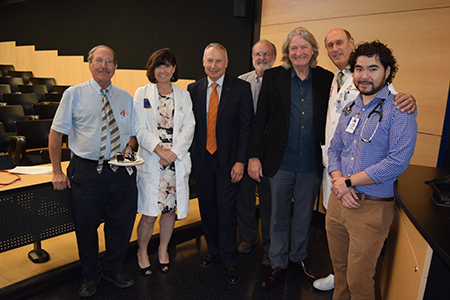 His talk brought people to their feet, clapping enthusiastically on a week where we honor military and former military personnel for their service to our country on Veterans Day.
His talk brought people to their feet, clapping enthusiastically on a week where we honor military and former military personnel for their service to our country on Veterans Day.
Dean Winslow, MD, FACP, FIDSA, a flight surgeon who served 35 years in the U.S. Air Force and current professor of medicine in the Division of Hospital Medicine and Division of Infectious Disease and Geographic Medicine at Stanford University Medical Center and the Stanford School of Medicine, spoke Wednesday, Nov. 9, about his time in Afghanistan and Iraq in a lecture titled, “From Bagram Airfield to Baghdad and Back Again—A U.S. Military Doctor's Experience in Two Wars.”
Joseph Alpert, MD, a UA cardiologist and past chair of the Department of Medicine, heartily introduced Dr. Winslow as not just a surgeon but a pilot who knew how to fly everything from a fighter jet to a C3 military transport plane.
Pictured above right: Drs. Monica Kraft, Dean Winslow, John Galgiani, Steve Klotz, Joe Alpert and Brent Roller. Dr. Winslow gave special recognition to Dr. Klotz' wife, Janet Campion, MD, MPH, a UA pulmonary and cystic fibrosis specialist who also is a trained USAF flight surgeon. To view an archived webcast of his talk, click here.
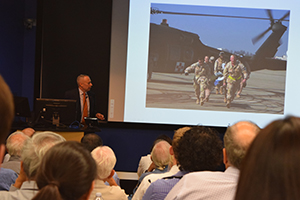
Dr. Winslow started by calling to the audience for other veterans, with a dozen or more faculty, fellow and resident physicians raising their hands.
He discussed the string of terrorist attacks on the United States and U.S. forces leading up to 9/11, being called back to duty afterward, serving in Afghanistan and Iraq, the weapons and improvised explosive devices (IEDs) used, types of wounds suffered and more. Everything was illustrated in a slide show of photos that graphically displayed initial triage to recovery, commemorating the sacrifices made by patients—including soldiers, airmen and seamen, Afghani and Iraqi civilians, and even a few insurgents.
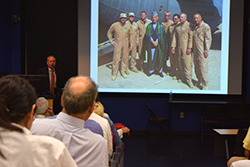 He had an incisive grasp of the history and culture of the people and what they’d endured since the Soviet invasion of Afghanistan in 1979 through the U.S. military surge in Iraq.
He had an incisive grasp of the history and culture of the people and what they’d endured since the Soviet invasion of Afghanistan in 1979 through the U.S. military surge in Iraq.
Retiring just before a promotion to brigadier general, Dr. Winslow served on one flight as designated surgeon to former Afghan President Hamid Kharzai (pictured in center at right).
He showed several Afghani and Iraqi children and other patients who he assisted in getting transferred to U.S. facilities for further treatment since, in Iraq—for instance—many physicians had left the country and local medical care for burns, scoliosis or heart conditions, etc., was limited at best.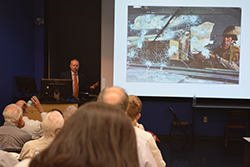
He talked about sleeping in his scrubs and putting on a flight suit and sidearm—out of respect and to relieve junior officers of the burden—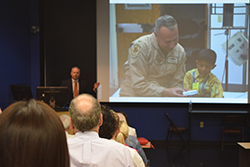 to go each afternoon to sign death certificates for the bodies of those who hadn’t made it through the day’s conflicts or surgeries.
to go each afternoon to sign death certificates for the bodies of those who hadn’t made it through the day’s conflicts or surgeries.
An infectious disease specialist by advanced training, he also tossed in a few interesting cases for our fellows to consider.
Tellingly on the day after the U.S. election, he included a slide with quotes of Gen. Dwight Eisenhower, President-Elect Donald Trump and Sen. Ted Cruz under the heading “One of these three is not like the other…”
“I hate war as only a soldier who has lived it can, only as one who has seen its brutality, its futility, its stupidity.” — Gen. Dwight D. Eisenhower, former U.S. President and European Supreme Allied Commander, World War II
“I’m very concerned about the results of the election,” Dr. Winslow said. “As someone who believes in kindness and compassion, I’m just very horrified that someone even says that it’s okay to kill innocent civilians, it’s okay to torture people, to do waterboarding. I just hope that was bluster and not real.”
Frequently teary-eyed as he mentions this patient or that colleague, he closed with a shot of him and a crew headed home in 2011 after switching to blue jeans (a no-no) instead of fatigues on a layover in Tbilisi, Georgia. When a younger staffer asked if they could get in trouble, he replied, “What are they gonna do—give us a buzzcut and ship us off to Afghanistan?”

